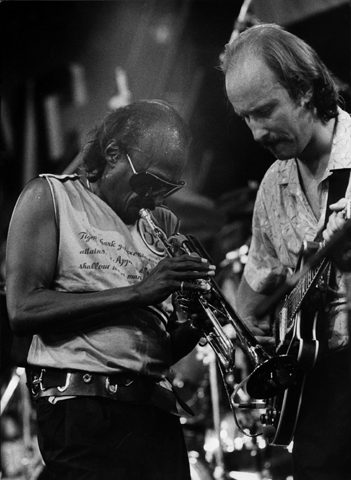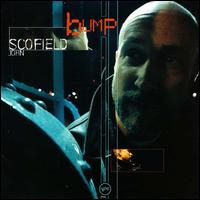

Courtesy of John Scofield
Photo by Gunnar Holmberg

Verve Records
A
FIRESIDE CHAT WITH JOHN SCOFIELD
John Scofield and Bill Frisell are my favorite guitarists (not to slight
John Abercrombie, Joe Morris, or Mike Stern). And I am not into the guitar
at all. I think I own two Wes Montgomery records. Sco has always caught
me off guard. First, he won his way into my heart with superb Blue Note
records like Time on My Hands, What We Do, and Meant to Be that helped
put Joe Lovano on the map. Soon after, the guitarist unleashed Quiet,
a killer acoustic effort with Wayne Shorter guesting on tenor, followed
by A Go Go and the newly released Bump (both with members of the hip,
Medeski Martin and Wood). Sco just reinvents himself with the times. He
is the Madonna of improvised music. Nice. So I present unto you, Sco,
unedited and in his own words.
FRED JUNG: Let's start from the beginning.
JOHN SCOFIELD: Well, I started playing guitar when I was eleven and was
into just trying to learn a few chords really. I learned some pop songs
and that gradually got more and more important in my life. I loved music
and I was checking out rock and roll and got into blues heavily and then
took guitar lessons from a guy who was into jazz. This was in Connecticut,
where I grew up. He was a good bebop player. He turned me onto bebop when
I was about sixteen years old, into jazz music and that was it. I've been
a jazz addict ever since. I then moved up to Boston and went to the Berklee
School of Music.
FJ: How long were you at Berklee?
JOHN SCOFIELD: Two years,two and a half years. I loved it in Boston. I
had come from a small town in Connecticut, so it was great to be thrown
in there with a thousand other nineteen-year-old jazz maniacs.
FJ: You were only in your early twenties when you played Carnegie Hall
with Chet Baker and Gerry Mulligan for a Thanksgiving concert in 1974.
JOHN SCOFIELD: Yeah, I got to play with those guys. That was my first
gig in New York was a live at Carnegie Hall concert that was record CTI
Records and so the pressure was on. I was in Gerry Mulligan's band and
Gerry had hired me to join his band in '74 and then we played some with
Chet and I played a little wit Chet later on his record, You Can't Go
Home Again. I idolized those guys and it was great to be around them a
little bit and to play that kind of music with that of temperament. It
was wonderful.
FJ: You were a member of Miles Davis' band for a number of years, it is
always of deep interest for me because he was such an enigma and so much
has been written about him.
JOHN SCOFIELD: As well as being a celebrity, which he was and this enigmatic
figure that was very controversial and would say things, I knew him as
a great trumpet player, bandleader, and composer, and just a musician,
who was all about music. That is the Miles that we knew, the musicians
that played with him. That is the important Miles. They are on record,
what he did and his music. I loved it. When I first started to have bands,
after I had played with him, I kind of tried to act like he did and then
I quickly found out that that is not going to work at all (laughing).
He was kind of a dictator from the old school and that didn't work with
me. I did learn a lot about the subtleties of combining musicians and
what could happen if you played a certain way and playing with space and
organizing a night of music or an album of music and mainly letting the
inspiration come while you are playing and being patient and allowing
the music to unfold.
FJ: You recorded several excellent albums on Blue Note and a familiar
name, Joe Lovano, in your quartet.
JOHN SCOFIELD: Well, thanks, Fred. I went to the Berklee School with Joe.
I have known Joe since then. We have known each other around New York
all this time, more than twenty years. I always loved his playing. I think
he is a phenomenon too. There is nobody like Joe. He brings something
to the music, some special energy and he swings so hard. He has got such
roots. I mean he is so phenomenal. I think whether he played with me or
not, we'd be listening to him. We have a good thing when we play. We played
together last summer too (with Dave Holland and Al Foster). It worked
out really well. We hope to do a record together again in a year or so.
He is just one of those people that I have met in my time that I really
have felt a connection with. I look forward to playing with him some more.
FJ: Let's touch on the three albums you have released on the Verve label,
first, Quiet. In a past life, when I was doing regional work for Tower,
I put it on a listening post and it consistently sold.
JOHN SCOFIELD: Thanks, Fred, thanks. I like that one too. It really was
fun to make. It was different because I wanted to do some more harmonic
music that was sort of quieter and I wanted to orchestrate it for a orchestral
horn section with French horns and alto flutes and all. I got Wayne Shorter
to play on a few cuts and that was such a thrill and a half. He's one
of my idols and I decided to play acoustic guitar all the way through
because it's the music I thought. It is something different for me. Yeah,
I am proud of the record and I worked hard on the arrangements. Bill Stewart,
Steve Swallow, wow. Thanks for listening to that one.
FJ: You followed that up with A Go Go, an album you did with Medeski,
Martin, and Wood. The image that is prevalent in jazz is that it so polarized
and A Go Go dispels that rumor.
JOHN SCOFIELD: Yeah, yeah, some guys like straight-ahead and some guys
don't like that. It's all Medeski, Martin, and Wood and me. Here's the
thing, Fred, I heard those guys and I just loved their groove and the
stuff that they were going for and they liked R&B and a lot of the same
stuff that I liked, the Meters and James Brown and stuff. They brought
that to their music, but with an improviser kind of head. I just thought
it would be perfect to play with them and so I called them up and we did
it. The reason we did it was because of a like-mindedness in the musical
conception.
FJ: And your latest release, Bump.
JOHN SCOFIELD: On my new record, Bump, that was kind of my return to funky
kind of music, A Go Go and Bump is the same genre, kind of, but there
is no organ on it and I overdubbed more guitars and I invited all these
guys from these different groove bands that I played opposite of after
the A Go Go thing came out. I started playing those jam band festivals.
I heard Deep Banana Blackout and Soul Coughing and Sex Mob and these bands
and I decided to use some of those musicians on Bump and put it together
and Chris Wood played bass too. Kenny Wollesen and Tony Scherr, I know
them as jazz musicians. They are just fantastic.
FJ: I saw you at one of the indie rock gigs at the Wetlands in New York
over the summer last year.
JOHN SCOFIELD: I would just play these little jam band gigs that would
have a few different bands and it has been fun, but for kids, for dancing.
FJ: You played with DJ Logic.
JOHN SCOFIELD: Oh, yeah, when I was playing with Logic. We were just improvising,
but it was fun. DJ Logic is incredible.
FJ: His turntables are an instrument. I saw him improvise.
JOHN SCOFIELD: Yeah, the idea of can you mix a DJ with "jazz." It all
depends on who is playing and Logic has a very tasteful approach and musical
approach and he is into playing with improvisers, with jazz musicians
and it is a great combination with him. Somebody else may be hard to play
with, but not Logic.
FJ: Aren't you concerned you are offending the purists?
JOHN SCOFIELD: I think it is confusing to some people. I try not to think
about it as far as worrying about what am I. I like funk and I like straight-ahead
jazz too. When I play with one kind of group, I may have a little more
bebop in me and another group, I may do something else. Blues has always
been part of my thing. I think every guitar player has the blues. It is
almost built into the instrument with blues phrasing. I just don't worry
about it. I try not to (laughing).
FJ: Tour plans?
JOHN SCOFIELD: Oh, yeah, Fred, I am going to be all over the place. You
are in Orange County?
FJ: Need time away from the shiny lights of Los Angeles.
JOHN SCOFIELD: Well, I will be playing at the Coach House and we are playing
in LA at USC (University of Southern California).
FJ: My alma mater.
JOHN SCOFIELD: This is April 15, 16, 17, around in there.
FJ: Who is in the band?
JOHN SCOFIELD: I will have the drummer from the record, Eric Kalb from
Deep Banana Black and Mark De Gli Antoni from Soul Coughing on keyboard
samples. I have been touring and the receptions been great.
FJ: The Wetlands gig made me realize just how vibrant the music can be
among the younger generation, if presented in an unpretentious fashion.
Can jazz be conveyed to the younger generation of today?
JOHN SCOFIELD: It is capable of reaching some of them. I don't think it
is going to become like the Dave Matthew's Band or something, like a big,
huge pop thing. Right now, the young audience, college age audience is
really comfortable with improvising and they like it. And they like things
like Logic, making different things happen and going on a jam and having
it go different places and having that creative magic happen in the room.
It's just fantastic. You would think that that would translate to a lot
of them getting into jazz. The same spirit in the music would be there.
I think the future is really good.
Fred Jung is Editor-In-Chief and wishes he were somewhere else. Comments? Email him.